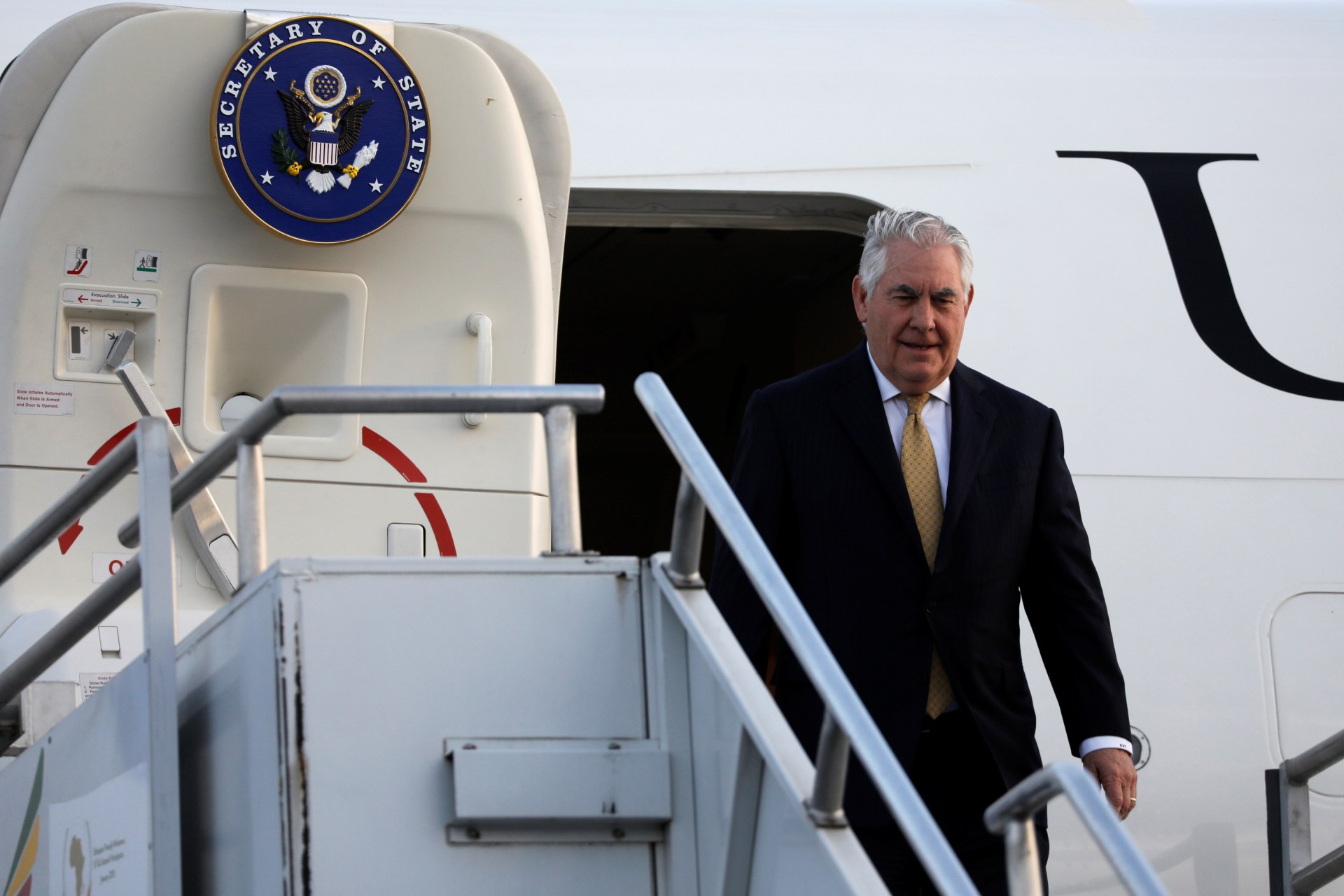Trump’s Africa Policy Taking Shape With Tillerson’s Trip
The secretary of state is by far the most senior member of the Trump administration to visit Africa, naturally raising the possibility of a reset in the administration’s approach to the continent.

By experts and staff
- Published
By
- John CampbellRalph Bunche Senior Fellow for Africa Policy Studies
Up to now, the Trump administration has had no clear or coherent policy toward Africa. The president met with visiting African heads of state on the margins of the 2017 UN General Assembly, where he mispronounced ‘Namibia’ and talked about his friends making money in Africa in a way reminiscent of the “scramble for Africa.” He has met with Paul Kagame, the current chairperson of the African Union, but otherwise his interaction with Africans and Africa has been minimal.
Nikki Haley, U.S. ambassador to the UN, made a well-regarded trip during which she visited refugee camps and met with President Kabila of the Democratic Republic of Congo. Still more positively, the administration has also made available substantial sums for humanitarian relief, though it is unclear how much is “new money” rather than left over funding from previous years. While Tillerson met with thirty-seven African foreign ministers in Washington in November 2017, this will be his first visit to Africa as secretary of state.
The secretary of state is by far the most senior member of the Trump administration to visit Africa, naturally raising the possibility of a reset in the administration’s approach to the continent. On March 6, just before he left, Tillerson gave a speech at George Mason University that would seem to be the most coherent overview to date of the Trump administration’s policy toward Africa. On the positive side, Tillerson acknowledged the importance of Africa to U.S. national interests, and the importance of a U.S.-Africa partnership in a host of different areas. He spoke favorably of initiatives by previous Republican and Democratic administrations, specifically the President’s Emergency Plan for AIDS Relief (PEPFAR), the Millennium Challenge Corporation, the African Growth and Opportunity Act (AGOA), Power Africa, and the Young African Leaders Initiative (YALI). While all have generally been regarded as successes, at various times President Trump or others in his administration have been critical of them, not least because they are associated with the president’s predecessors. Less positively, his speech was heavily weighted toward security issues rather than political, social, or economic development. Indeed, security in Africa is what most of the speech was about. The speech foreshadowed no new policy initiative that might be the signature of the Trump administration’s Africa policy, as, for example, PEPFAR was for President George W. Bush or YALI was for President Obama. Curious was Tillerson’s tough language calling for greater engagement by African governments against North Korea’s nuclear program. Tillerson also used harsh language about Chinese involvement in Africa, somehow implying that the Africans could not or would not resist the blandishments of Beijing.
At one point in time, the United States was probably the most popular country in Africa. President Trump’s notorious expletive characterization of Africa and Haiti in January, however, severely damaged the U.S. image on the African street. President Trump in a subsequent letter to the African Union affirmed the importance of the U.S.-Africa partnership, publicly mollifying Africa’s leadership, which would prefer to move on, but his statement likely did not significantly change the general mood towards him. Particularly on a continent where about half of the population is Muslim, rhetoric from the administration seemingly hostile to Islam and seeming too often to link it with terrorism has also colored negative perceptions of the United States. President Trump’s travel ban included three African countries, Libya, Chad, and Somalia. African Muslims who follow the Middle East are also chagrined at the Trump administration’s decision to move the U.S. embassy to Israel from Tel Aviv to Jerusalem. Administration proposals to cut the budget of the Department of State, USAID, the UN and its agencies would hit Africa the hardest, in part because it is the world’s poorest and most conflict-ridden continent. Meanwhile, the administration has not moved to fill the key position of assistant secretary of state for Africa, and other important diplomatic positions remain unfilled, such as ambassador to South Africa and to Tanzania. Neither the president nor the vice president has visited Africa nor has indicated plans to do so.
Nevertheless, given the Trump administration’s lack of attention up to now, the most important aspect of Secretary Tillerson’s Africa trip is that it is happening at all. Its symbolic value, its reaffirmation of the importance of Africa and our partnership with it is more important than the specifics of his departure speech or his exchanges with his interlocutors. His travel shows that we care, but an ill-considered or insulting presidential tweet could undo whatever Tillerson’s visit might accomplish. So we hold our breath.